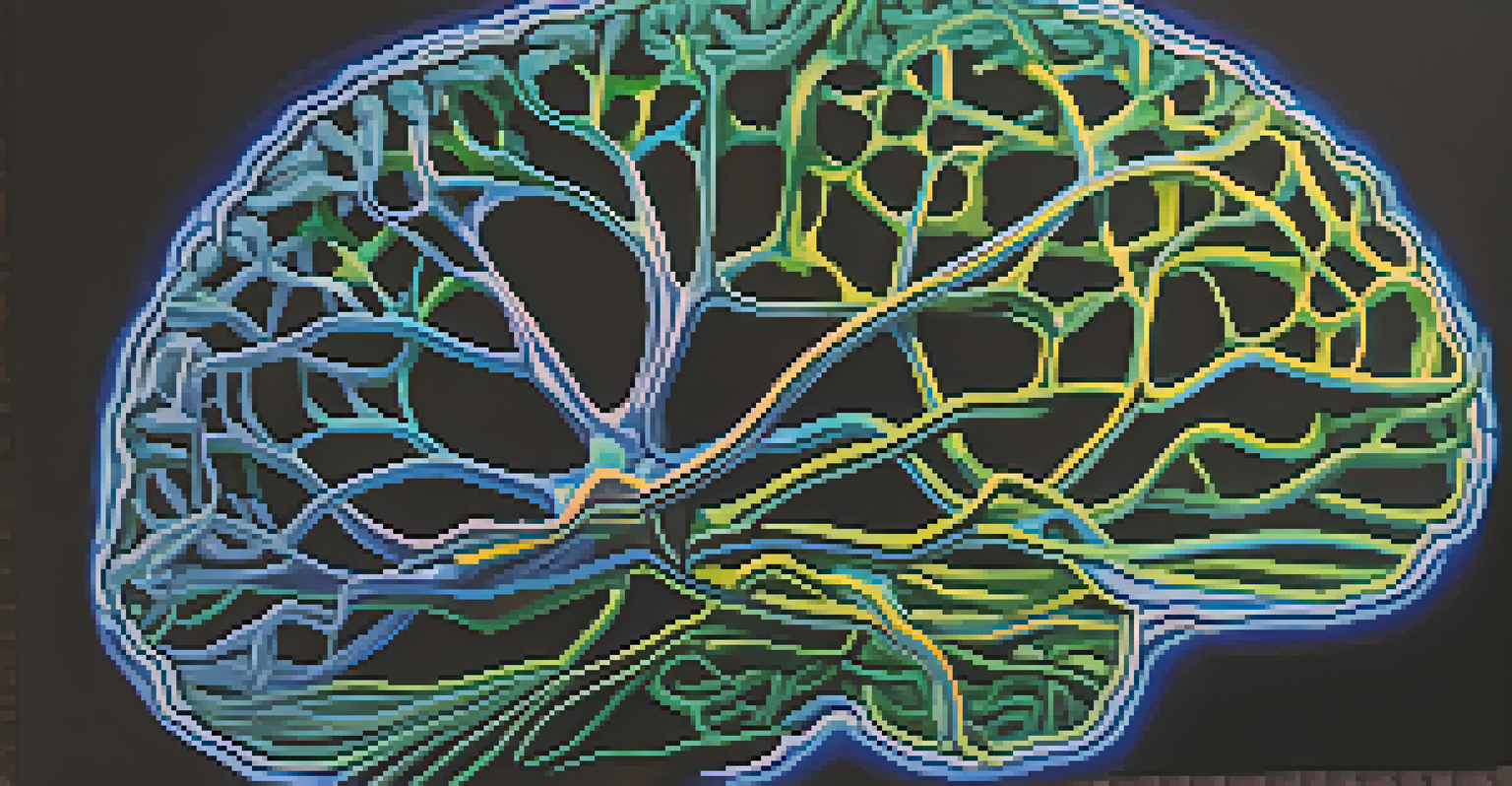The Impact of Hallucinogens on Anxiety: Current Trials

Understanding Anxiety and Its Challenges
Anxiety disorders affect millions worldwide, manifesting as overwhelming fear or worry. They can disrupt daily activities and impact overall quality of life. Traditional treatments, like therapy and medication, often provide limited relief, leading many to seek alternative solutions.
The mind is everything. What you think you become.
In recent years, there's been a growing interest in how hallucinogens might offer a new approach to alleviating anxiety. These substances, including psilocybin and LSD, have been used for centuries in various cultures, but their therapeutic potential is only now being fully explored. Understanding these connections can open doors to innovative treatment options.
By addressing the underlying causes of anxiety rather than just the symptoms, hallucinogens may provide patients with a fresh perspective on their mental health. This shift in treatment philosophy highlights the importance of continued research into the efficacy of these substances.
The Role of Hallucinogens in Mental Health
Hallucinogens are substances that alter perception and can induce experiences that feel profoundly meaningful. These experiences can lead to a reevaluation of personal beliefs and life situations, which is especially beneficial for individuals struggling with anxiety. The mind-altering effects may help break the cycle of negative thought patterns.

Research has shown that hallucinogens can promote neuroplasticity, which is the brain's ability to reorganize itself by forming new neural connections. This could potentially help those with anxiety disorders by allowing them to forge new pathways in their thinking, thereby reducing anxiety symptoms. Neuroplasticity is a promising concept that scientists are eager to explore further.
Hallucinogens may ease anxiety
Research suggests hallucinogens like psilocybin and LSD could provide new therapeutic options for individuals struggling with anxiety disorders.
Moreover, these compounds can lead to increased emotional openness, allowing individuals to confront their fears in a supportive environment. The therapeutic setting, often accompanied by trained professionals, can enhance the healing process and provide a safe space for exploration.
Current Trials: Psilocybin and Anxiety
Psilocybin, the active compound found in magic mushrooms, has garnered significant attention in clinical trials. Recent studies indicate that psilocybin can lead to substantial reductions in anxiety and depression, especially in patients with terminal illness. This offers hope for individuals who feel trapped by their circumstances.
Anxiety does not empty tomorrow of its sorrows, but only empties today of its strength.
In one notable trial, participants reported feeling a sense of clarity and acceptance after psilocybin sessions, which contributed to alleviating their anxiety. The combination of guided therapy and the hallucinogenic experience proved to be effective in helping them process their emotions. These findings suggest that psilocybin's therapeutic potential might be harnessed more widely.
As more trials emerge, researchers are excited to uncover the optimal dosages and therapeutic settings for psilocybin use. The goal is to refine these approaches to maximize the benefits while minimizing potential risks.
LSD and Its Promising Potential in Research
LSD, another well-known hallucinogen, is also being investigated for its impact on anxiety. Early studies suggest that LSD may enhance emotional processing, allowing individuals to confront and manage their anxiety more effectively. This can lead to significant improvements in mental well-being.
The effects of LSD are reported to be longer-lasting compared to other hallucinogens, which might provide a unique advantage in therapeutic settings. Participants in studies have described profound shifts in perspective and emotional release during their experiences. Such insights could facilitate deeper healing and understanding of their anxiety.
Neuroplasticity enhances treatment
Hallucinogens promote neuroplasticity, which may help patients develop healthier thought patterns and reduce anxiety symptoms.
While research is still in the early stages, the results so far are promising. Continued studies will help clarify the best practices for utilizing LSD in treatment and how it can complement existing therapies.
Safety and Ethical Considerations
As with any treatment, safety is a top priority when considering the use of hallucinogens for anxiety. While many studies report minimal adverse effects, it's essential to conduct these trials under controlled conditions. This ensures the well-being of participants and the integrity of the research.
Ethical considerations also come into play, particularly concerning informed consent and the potential for misuse. Researchers must ensure that participants fully understand the nature of the substances and the experiences they may encounter. Transparency is crucial to building trust and ensuring that participants feel safe throughout the process.
Furthermore, the integration of hallucinogens into mainstream treatment must be approached thoughtfully. Continued dialogue among researchers, clinicians, and regulatory bodies will be key to developing guidelines that prioritize patient safety and maximize therapeutic benefits.
The Future of Hallucinogens in Mental Health Treatment
The potential of hallucinogens to treat anxiety disorders is gaining traction, with ongoing research paving the way for more comprehensive understanding. As trials expand, we may see these substances become integrated into conventional treatment protocols. This shift could revolutionize mental health care for many.
Moreover, the stigma surrounding hallucinogens is gradually diminishing as scientific evidence mounts. Public perception is changing, and there is a growing acceptance of their therapeutic use. This cultural shift is crucial for advancing research and opening doors to innovative therapies.
Safety and ethics are vital
Ensuring safety and ethical standards in hallucinogen research is crucial for building trust and maximizing therapeutic benefits.
Ultimately, the future of hallucinogens in mental health treatment hinges on continued research, education, and advocacy. By fostering a collaborative approach, we can work toward a more holistic understanding of mental health and the potential benefits that these substances may offer.
Conclusion: A New Horizon for Anxiety Treatments
In conclusion, the exploration of hallucinogens as a treatment for anxiety disorders represents a significant shift in mental health care. The current trials are revealing promising results, suggesting that these substances may help individuals confront their anxiety in new and meaningful ways. As research progresses, we are likely to see more evidence supporting their efficacy.
The journey towards acceptance and integration of hallucinogens into therapeutic settings is ongoing. It requires careful consideration of safety, ethics, and the nuances of each individual's experience. By fostering a supportive environment for research, we can unlock new pathways for healing.

As we stand on the brink of a new era in mental health treatment, the potential for hallucinogens to make a positive impact on anxiety is both exciting and hopeful. Continued exploration and open-mindedness will be essential as we navigate this evolving landscape.